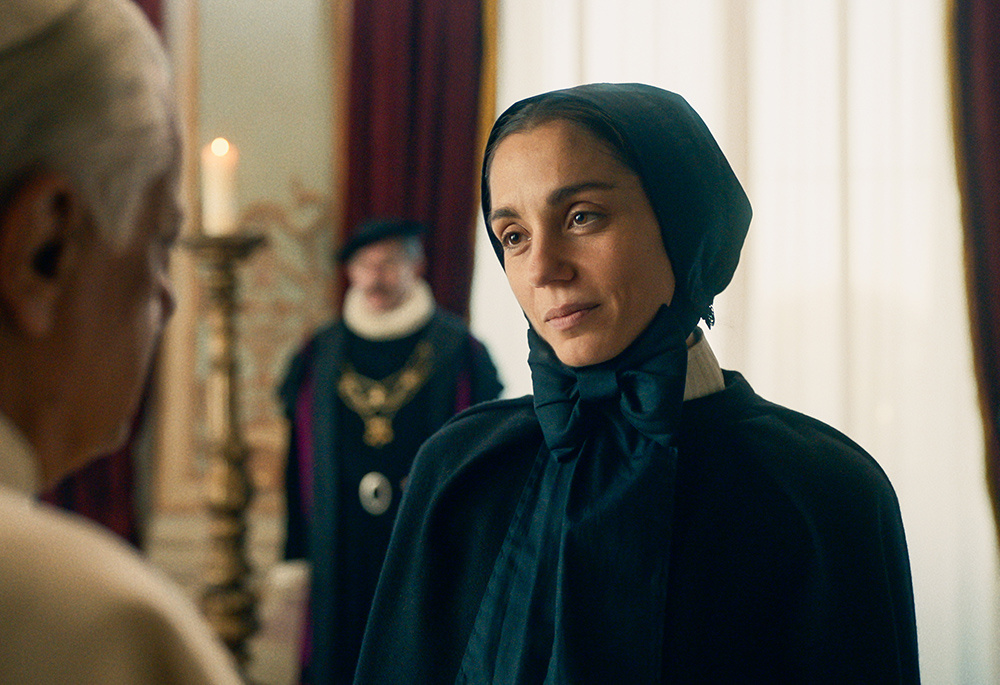
In a scene from the film "Cabrini," Mother Frances Xavier Cabrini, played by Italian actress Cristiana Dell'Anna, meets with Pope Leo XIII, played by veteran Italian actor Giancarlo Giannini, at the Vatican. (Courtesy of Angel Studios)
A new film premiering this week captures the life, spirit and witness of Mother Frances Xavier Cabrini (1850-1917), the founder of the Missionary Sisters of the Sacred Heart of Jesus and best known and honored as the patron saint of immigrants.
The film, entitled "Cabrini," will open in theaters today (Friday, March 8), to coincide with International Women's Day. The film, directed by acclaimed director Alejandro Monteverde, focuses on Cabrini's initial ministry in New York City — which began in 1889 and was marked by Cabrini's stubborn persistence to initiate and then expand an urban ministry to help Italian immigrants, particularly Italian American children.
"Mother Cabrini made things happen," J. Eustace Wolfington, the film's executive producer said in an interview with Global Sisters Report. "She found solutions. She was about the immigrant."
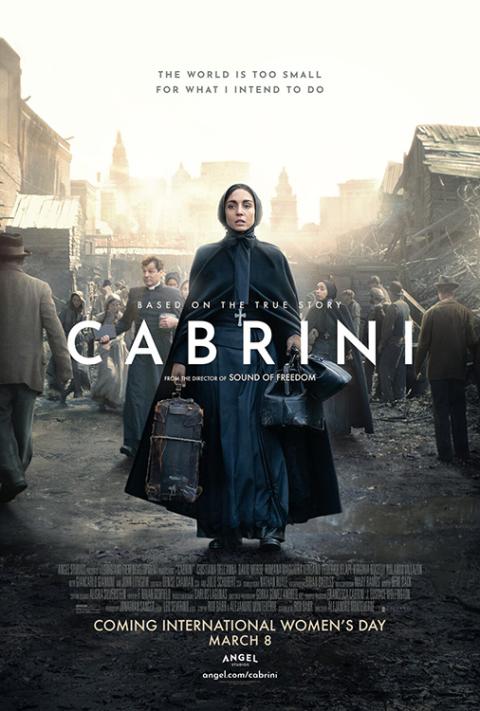
A poster image of the new film "Cabrini," premiering March 8 on International Women's Day (Courtesy of Angel Studios)
But beyond its portrayal of an important part of Cabrini's life and ministry, he said, the film is also meant as a tribute to Catholic sisters everywhere, whose work he believes is often overlooked and not appreciated enough within the church or by the wider society.
"The movie gives them a voice," he said of Catholic sisters, groups of whom have seen the film in private preview screenings. "They say, 'It's restored the dignity of sisterhood.' "
Wolfington said the reaction of sisters who have seen the film has been rapturous — particularly members of the congregation she founded.
" ' That's Cabrini, that's Cabrini,' " Missionary Sisters of the Sacred Heart of Jesus have said after watching preview screenings of the film, Wolfington said.
Two such sisters are Missionary Srs. Diane Olmstead and Pietrina Raccuglia, both members of the congregation's Guadalupe Province.
In a joint interview with GSR, the two said between them they had seen the film nine times — six for Raccuglia and three for Olmstead. And both said they would gladly watch "Cabrini" again — and plan to.
Both said the film was inspiring for many reasons — for depicting Cabrini's spirituality; the many challenges she faced in her ministry beginning in New York City's gang-ridden Five Points area; and in providing an accurate portrayal of sisters working in the world.
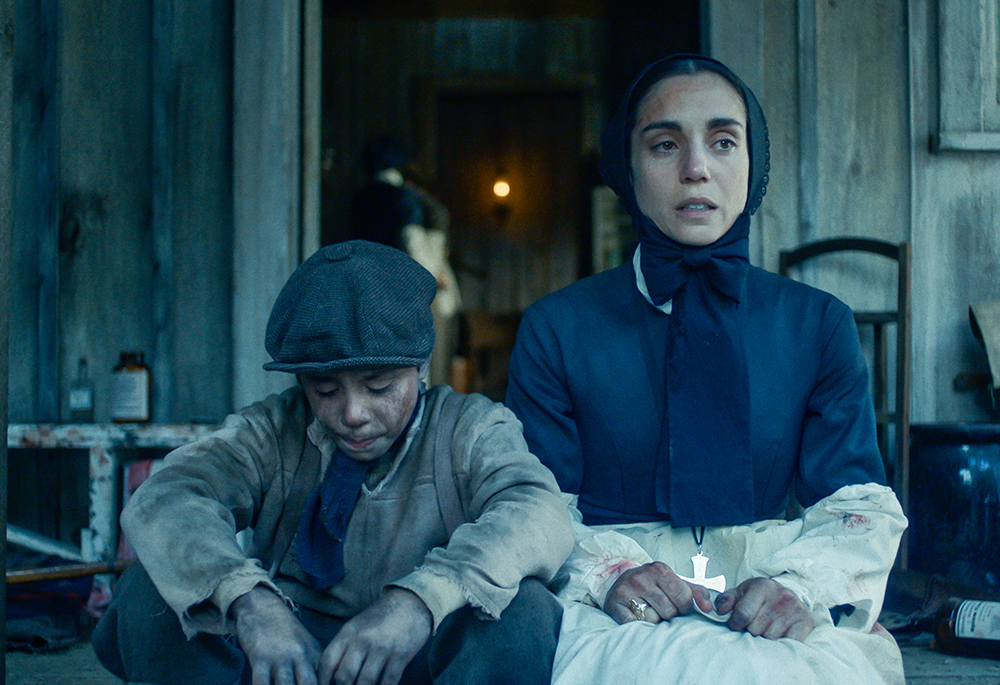
In a still from the new film "Cabrini," Mother Cabrini, played by Italian actress Cristiana Dell'Anna, is seen in a scene early in the film, sitting next to one of her orphans during her initial ministry on the streets of New York. (Courtesy of Angel Studios)
"It's a clue as to her relationship with Jesus," said Raccuglia, who is chair of the board of the New York-based Cabrini Mission Foundation. The movie explicitly depicts "the mission of showing the love of Christ in the world, and that everyone is loved by God."
" 'Cabrini' shows that Mother Cabrini had a passion for Christ, she had a passion for humanity," said Olmstead, the provincial superior of the congregation's Guadalupe Province.
The film movingly portrays the sister's persistence and Cabrini's odds-defying attempts in the face of several obstacles, including deep-rooted prejudice against Italians who had immigrated to the United States, and a Protestant-dominated civic and political culture in New York that refused to recognize the humanitarian efforts of Cabrini and her fellow sisters.
Cabrini, who is portrayed by Italian actress Cristiana Dell'Anna, also faced a sometimes uncooperative Catholic hierarchy in New York and Rome — though the film makes clear that Cabrini was able to overcome initial resistance by male clerics with her persistence, passion and sound business sense.
Raccuglia notes that Cabrini's relationship with Archbishop Michael Corrigan — and a cornerstone of the film — was at first uneasy, but that letters between them show they eventually become friends of a sort. (In the film, Corrigan is played by American actor David Morse.)
And while she was obedient to church authority, Cabrini was sometimes impatient when told to keep her place as a woman. "She only wanted to keep the place for Jesus," Raccuglia said.
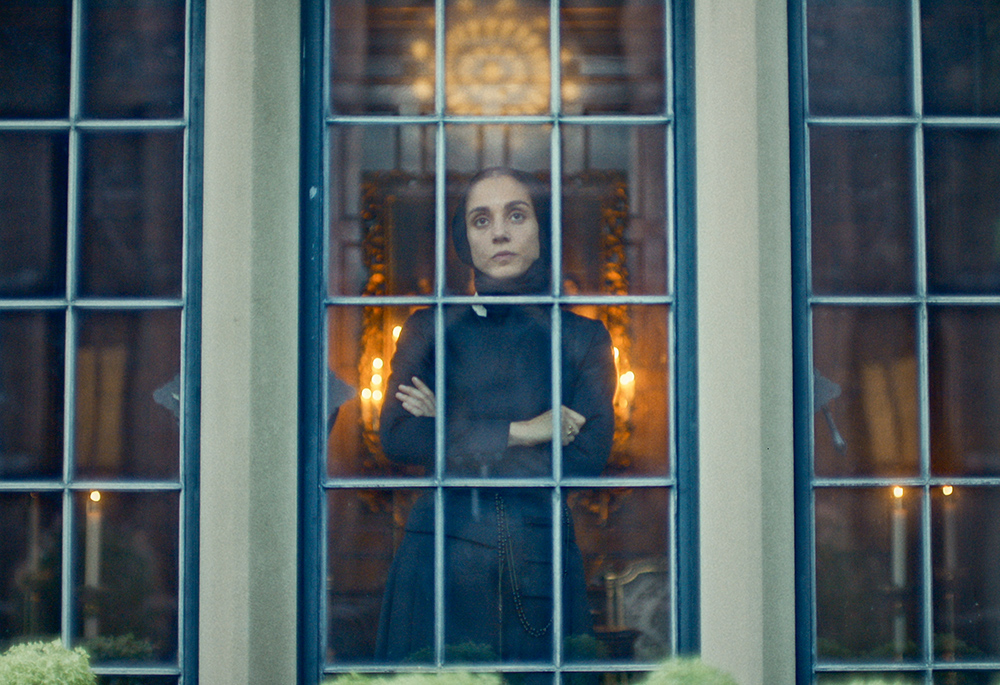
A still from the new film "Cabrini," in which Mother Frances Xavier Cabrini is played by Italian actress Cristiana Dell'Anna. (Courtesy of Angel Studios)
"She always went into the world as a woman of the church," Olmstead said. "She believed in authority — and she was a woman of her time."
"She was clear in her ministries that she was not disrespectful. She was obedient. But it was not blind obedience."
Nonetheless, the film shows that, at nearly every turn, Cabrini was met with some new challenge that she was ultimately able to overcome — to the amazement, frustration and then grudging admiration of figures like Pope Leo XIII, played by veteran Italian actor Giancarlo Giannini, who tells her at one point, "You fascinate me, Cabrini. I can't tell when your faith ends and your ambition begins."
That moment, writes reviewer Frank Scheck in a generally positive Feb. 29 review in The Hollywood Reporter, is one of several in which the film "smartly avoids making the character a cardboard saint."
Indeed, the film — which Scheck describes as an "old-fashioned, classically styled biopic" — doesn't downplay the title character's stubbornness in the face of adversity.
At one point the lead character says: "The world is too small for what I intend to do."
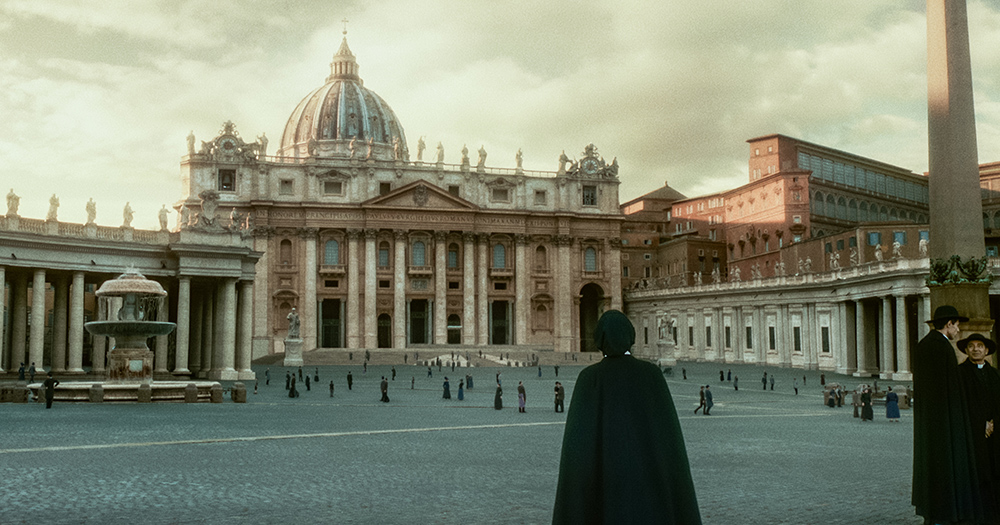
A scene in the film "Cabrini" in which Mother Cabrini returns to Rome to meet with Pope Leo XIII. (Courtesy of Angel Studios)
But the film also makes clear that becoming a saint requires depths of spiritual resources and persistence, not just holiness.
And street smarts. "She was a saint, and she was holy," Wolfington said. "But she was a great businesswoman. People were shocked by how sharp she was."
"She knew how to work the system," Raccuglia said.
The film is being distributed by Angel Studios, which also released Monteverde's 2023 film "Sound of Freedom," which focuses on child sex trafficking.
Wolfington, 91, said he has long been attached to Cabrini as a figure of reverence and inspiration and that he made her his patron saint at age 23. But despite Cabrini's place of honor in the Catholic world, he hopes the film can be embraced in a universal way, by Catholics and non-Catholics alike, who might see Cabrini as a saintly humanitarian figure like Mother Teresa or Mahatma Gandhi.
While the film is not meant to comment directly on the current American debates about immigration, Wolfington says, " 'Cabrini' is a movie of this time" and clearly recognizes that there is a long history of prejudice against immigrants in the United States.
At one point in the film, a passerby throws a brick emblazoned with an ugly anti-Italian slur through a window of a hospital Cabrini is working to renovate. In another scene, a fictional New York City mayor, played by two-time Academy Award-nominated actor John Lithgow, laments that his wealthy Manhattan Upper West Side constituents are tired of a "wave of brown-skinned filth parading up their street with a nun as their pied piper."
"The prejudice experienced by Italian immigrants wasn't exaggerated [in the film]," Wolfington said. "They really were persecuted. They were cheap labor. They were living in ghettos."
Raccuglia believes that Cabrini's passion for the rights of immigrants was so strong that, if she were alive today, she would be "at the border," working for immigrants at the U.S. southern border with Mexico.
What Cabrini did in her own time, Wolfington said, was to instill "the pride back into them [immigrants]."
Such pride came from her own life experience. Cabrini was born in northern Italy, founded her congregation in 1880 and traveled with six fellow Missionary sisters to the New World in 1889, despite her physical frailties — she was in delicate health for much of her life.
At one point a question is posed whether she should accept her weaknesses or "serve her purpose." She opted for the latter — and died at age 67, living to a much older age than she was expected to.
"When Cabrini was convinced of something, nothing stopped her," Olmstead said.
Advertisement
Cabrini had initially wanted to start missions in China, but Leo pressed her to go to New York, with its large Italian immigrant population.
She became a naturalized U.S. citizen in 1909, and was eventually canonized by Pope Pius XII in 1946 — the first American to be so honored. Over a ministry of 34 years, she eventually founded 67 hospitals, orphanages and schools, according to press information provided by the filmmakers.
Though the film focuses only on her early years in New York, she eventually worked in at least six other states, including Colorado, as well as in Latin America and Europe.
Still, Cabrini's influence is still felt in New York City:
- Cabrini Immigrant Services, a social service agency, continues work in assisting recent immigrants facing the many challenges of life in New York City.
- The New York-based Cabrini Mission Foundation helps fund and support programs by the Missionary Sisters and their partners, including work at the U.S-Mexican border.
- In Upper Manhattan, near Fort Tryon Park, Cabrini's remains are enshrined in a chapel altar at a chapel which daily attracts pilgrims from throughout the world.
- Meanwhile, a monument to Cabrini in lower Manhattan's Battery Park was dedicated in 2020 at a site that overlooks the revered Statue of Liberty and Ellis Island, landmarks long associated for their connection to the American immigrant legacy.
"Cabrini" was not filmed in New York City, but in and around Buffalo, New York, and other locales in western New York with additional scenes completed in Rome.
Wolfington said he agreed to sign on as executive producer with the stipulation that net revenues from the film would be donated to charity, including to the Missionary Sisters.
He hopes that will be a capstone for what he called "a major, major release for an independent film."
Olmstead and Raccuglia said while they hope the film might inspire some women to consider joining their congregation, another hope is that viewers of "Cabrini" will "get out of themselves and help someone in need," Raccuglia said. Or as Olmstead put it: "to be missionaries of love in the world."
They also hope that "Cabrini" gives new audiences some idea of what religious life is actually like, as so many films, they believe, do not accurately depict the lives or ministries of sisters.
"Yes, this film is about Mother Cabrini, but it's also about the lives of religious women and the work they do in the world," Olmstead said.
"This movie," Raccuglia said, "is a tribute to sisters everywhere."







